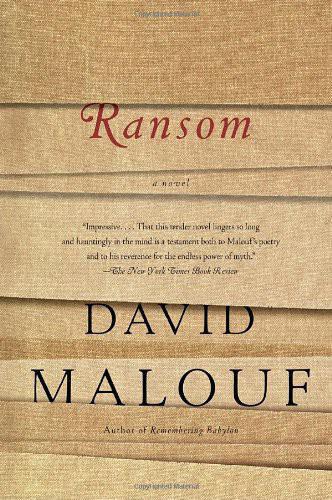
Ransom
Vintage International
کتاب های مرتبط
- اطلاعات
- نقد و بررسی
- دیدگاه کاربران
نقد و بررسی

Starred review from October 26, 2009
Revisiting scenes from The Iliad
and delving into the hearts of two ancient heroes, Malouf (Remembering Babylon
) evokes the final days of the Trojan War with cinematic vividness. After Achilles withdraws his forces from combat, a move that cripples the Greek army, his best friend, Patroclus, persuades Achilles to let him take the Myrmidons back into combat and to wear Achilles' armor. After Trojan king Priam's beloved son, Hector, kills Patroclus, guilt, rage and grief drives Achilles on a frenzied quest for revenge that sees him slay Hector and then tie Hector's corpse to his chariot and drag it around the besieged city. Priam, desperate to stop the desecration, decides to visit the enemy camp and offer money in exchange for Hector's body. He hires a humble cart driver and, aided by Hermes, they set out on a journey that takes Priam into the unknown and toward a meeting with Achilles. Though Malouf's sparingly deployed details, vigorous language and sly wit humanizes these tragic heroes, the story is unmistakably epic and certainly the stuff of legend.

December 1, 2009
The Australian poet of absences and silences reimagines the terror and exhilaration of the Trojan War.
Malouf (The Complete Stories, 2007, etc.) opens on a characteristically quiet note as he looks back more than 3,000 years to the plains of Scamander. A man stands on the shore, his ear cocked, listening for what we might imagine to be the whispering spirit of his mother."The man is a fighter," writes Malouf,"but when he is not fighting he is a farmer, earth is his element." It is the job of Achilles to put other men into the earth, many of them, as he takes his part in the ugly curse of the House of the Atreus. There before Mount Ida, he and his Myrmidons,"for nine years…have been cooped up here on the beach, all the vast hordes of them, Greeks of every clan and kingdom." Malouf's principal source, of course, is the greatest story any human has ever told, the majestic songs of the Iliad and Odyssey. He adds to it, as he writes in the afterword, with his store of experiences in Australia during wartime and readings from other ancient writers such as Apollodorus, as well as with liberal helpings of imagination that allow him to insert characters of his own invention into the proceedings. Given the possibilities already present in the tale of Achilles' rage, Hector's enmity and Patroclus' suffering, some readers may find these inventions to be lily-gilding, but no matter. Malouf's book works, illuminating the epics with language that comes from our own time while retaining its otherworldly poetry:"He is surprised, too, by the tallness of these Trojans. And their voices, which are thin and high-pitched, unlike his own and those of the folk he lives among." Savor this poem in prose alongside Christopher Logue's verse recastings of the Iliad in his War Music series.
A splendid, creative prcis of ancient events that still reverberate.
(COPYRIGHT (2009) KIRKUS REVIEWS/NIELSEN BUSINESS MEDIA, INC. ALL RIGHTS RESERVED.)

Starred review from December 15, 2009
The first novel in ten years from Australian-born 1996 IMPAC winner Malouf is a moving, lyrical retelling of Achilles' desecration of Hector's corpse and his capitulation to Priam's appeal for proper rites and burial for the Trojan hero. Malouf's prose is triumphantly sure, and his characterizations of the subtle and complex bonds between Priam and Achilles, gods and mortals, wives and husbands, parents and children, nobles and commoners, and beasts and men resonate with authority. This authorial credibility thrums strongest in Malouf's meditation on the relationship between Priam and Somax, the humble carter who bears his ransom to the Greek camp. Their connection is rooted in the novel's great theme of chance and the choices, obligations, and responsibilities it bestows on us. Malouf ultimately explores how chance, or opportunity, serves as the muse of all great storytelling. VERDICT Malouf's masterly return to the novel ably stands with recent versions of Homeric themes such as Seamus Heaney's "The Cure at Troy" and Christopher Logue's "War Music".J. Greg Matthews, Washington State Univ. Libs., Pullman
Copyright 2009 Library Journal, LLC Used with permission.

December 15, 2009
The Iliad concludes with an episode far more solemn than the burning of Troy. Achilles avenges Patroclus death by slaying Hector, Troys greatest warrior, and dragging the corpse behind his chariot before the walls of Troy daily for 11 days. No other Greek, let alone any Trojan, dares to try and stop Achilles. But Hectors father, Priam, king of Troy, has a vision and acts upon it. He doffs all his royal splendor, has a donkey cart loaded with treasure, and, sitting next to the carter, goes to the Greek lines to ransom his sons body on bended knee. Australias great contemporary novelist expands upon this deeply moving story most obviously by introducing a character not found in Homer, the humble carter; omitting the escort Homer allows Priam; and having the king appreciate human commonality by listening to the day laborers domestic and familial concerns. So doing, Malouf breathes a greater egalitarian spirit into an already profoundly humanizing legendwhats more, he does it in prose as good or better than the best modern Englishings of his source.(Reprinted with permission of Booklist, copyright 2009, American Library Association.)

























دیدگاه کاربران